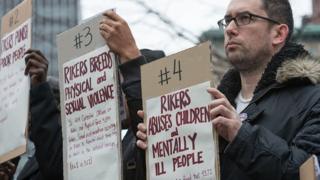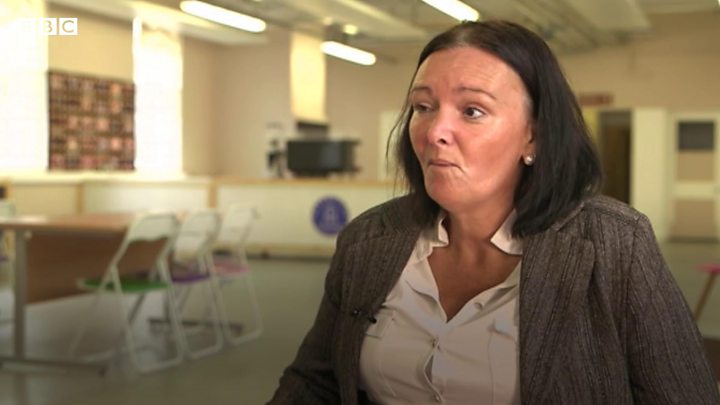Tales from inside NYC’s ‘Gladiator School’ jail
Vidal Guzman was 16 years old when he entered Rikers Island jail for the first time. As he crossed the bridge over to the island, a prison guard told him to “get ready for Gladiator School”.
In Vidal’s first week, he says, he saw two teenagers hang themselves.
“That shaped my mind,” he says. “They say that Rikers is everywhere in some shape or form. Rikers doesn’t leave you.”
This week New York City Council voted to close Rikers Island jail, which has housed famous inmates including Tupac Shakur, Sid Vicious, and Mark David Chapman – the man who killed John Lennon.
Council speaker Corey Johnson described the jail as “a symbol of brutality and inhumanity”.
“As a city, we must do everything we can to move away from the failed policies of mass incarceration,” he told councillors.
The detention centre is due to close by 2026 and will be replaced by four new jails under an $8.7bn (£6.7bn) proposal put forward by New York Mayor Bill de Blasio.
‘Attack on your soul’
Johnny Perez also first came to Rikers when he was 16 – arrested for gun possession. In and out of jail until he was 21, Johnny was eventually given a 13-year sentence for robbery. He has been incarcerated in nine different jails across New York state.
Was Rikers the worst? He laughs. “Yeah.”
“In Rikers, the officers give you a knife. They’ll sell you a razor,” he explains. “I’ve bought drugs from correction officers who’ve turned around and told me they’re going to put me in solitary if my mother doesn’t meet them in a parking lot to pay them.”
And solitary confinement, he says, is a “second-by-second attack on your soul”.
“There’s only one person you come into contact with and talk to, and this person is also responsible for locking you in and out of your cage,” he says. “If this person doesn’t even look you in the eye or talk to you, it kind of chips at you.”
Glenn Martin also first entered Rikers as a 16-year-old when he was charged with shoplifting. Last year, Rikers moved its youngest inmates out following a change in the ending the detention of under-18s in adult jails.
“It’s old, dilapidated, rusted,” he says. “It was frightening. It was a place where I had to learn quickly. If you allow people to take advantage, you can’t live there.”
He says he was stabbed four times during his time in Rikers.
“It’s a place where you have to choose: predator or prey.”
‘We all had the same story’
Like 90% of the inmates in Rikers, Vidal, Glenn and Johnny are black or Hispanic. All three are now anti-jail activists.
One of Vidal’s early childhood memories is the sound of his mother’s stomach grumbling as she gave him her last remaining food.
Speaking of his fellow prisoners, he says: “We all had the same story: a father figure who was incarcerated or wasn’t in their life.”
When he was five, Vidal was homeless for a year. Not much later he was on the streets, getting involved with gangs. By the age of 12, he was dealing drugs.
Johnny’s story is similar. He came to New York from Cuba at 10 months old.
“When I was 16 years old, I wasn’t trying to decide if I would go to band camp or karate school – I wasn’t even thinking about college,” he says. “I’m helping my mother, who is alone, to help feed my brothers.”
He says that in his community, which has very little trust in the police, people carry knives or guns as a means of protection. Incarceration becomes inevitable, he says.
He says “there needs to be a deeper understanding of how people come to break the law”.
“They’re actually reacting to something in their life and usually it’s a public health issue,” he argues, citing poverty, mental health and food insecurity as major factors.
“If you steal a coat to stay warm, you go to jail for that.”
‘Everything sends the message that you have no value’
Vidal says when he was released from Rikers, he “didn’t know how to come home”.
“I was not talking to anyone, waking up early in the morning being really defensive, thinking I would be in a fight,” he says.
“If you treat people like an animal, what do you think they are going to act like? An animal.”
With a criminal record, he found it impossible to get a job. Within a couple of years he was back in jail.
Glenn says that everything about incarceration “sends the message you have no value. If people treat like you have no value, you start believing other people have no value either. “
Glenn says that for the last 20 years, the closure of Rikers is all he’s thought about. His life after incarceration has not been smooth sailing.
In 2014, he set up the advocacy group JustLeadershipUSA, which he left last year amid allegations of sexual misconduct, which he denies.
He says his joy about Rikers’ closure is tempered – the devil is in the detail.
“It’s one thing to achieve closure but it’s equally important what happens next.”
‘There’s no version of incarceration that’s human and fair’
He believes that incarceration should be abolished altogether, arguing it does not work.
“There’s no version of incarceration that’s human and fair,” he says.
Johnny’s reaction to the announcement is similarly restrained – he says he is not popping champagne.
“We are still at a position where people are being incarcerated in New York. People with mental health concerns, people who have committed non-violent crimes – do they truly impose a threat to society?”
But Johnny also believes that abolition of incarceration cannot happen overnight and the closure of Rikers marks progress – a position that as a black man, he says, is not easy to take.
“But to go from 12 city jails to four – even if we have to build those four – I almost have the responsibility to support that.
“Starting clean is definitely a step in the right direction.”
Source: Read Full Article




